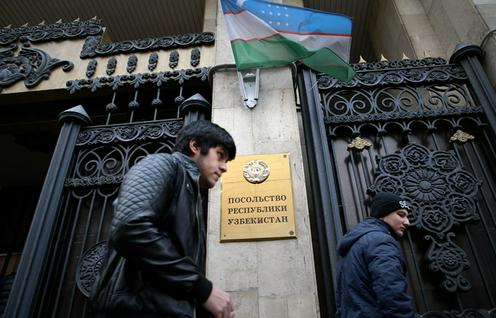The Embassy of Uzbekistan in Russia has submitted a diplomatic note to the Russian Ministry of Foreign Affairs, requesting a comment on the recent forceful raid by Moscow’s OMON at a migrant dormitory and a legal assessment of the security forces’ actions. The statement was made by Akhror Burkhanov, spokesperson for Uzbekistan’s Ministry of Foreign Affairs, via his Telegram channel.
According to Burkhanov, the incident in Moscow was discussed during a monthly meeting between Uzbek and Russian diplomats held on June 10. Representatives of Uzbekistan’s Foreign Ministry expressed concern over reports of unauthorized searches and harsh treatment of the country’s citizens in the Russian Federation.
“We emphasized that such incidents are completely incompatible with the friendly relations between our countries and that specific measures must be taken to prevent them,” the ministry’s press office stated.
Burkhanov stressed that protecting the rights and interests of Uzbek citizens living or temporarily staying abroad remains a top priority. In this context, Uzbek diplomats called on their Russian counterparts to ensure compliance with international law and human rights standards in the treatment of foreign nationals. They also urged Russian authorities to treat Uzbek citizens with respect and to refrain from degrading their dignity and honor.
Uzbekistan’s Foreign Ministry noted that it is monitoring the situation closely and will continue to take appropriate action if necessary. Officials also stated that the Uzbek Embassy in Moscow is maintaining an open dialogue with the Russian side through diplomatic channels on pressing issues.
On June 11, Russian Foreign Ministry spokesperson Maria Zakharova confirmed receipt of the note from Uzbekistan. “Verified information will be forwarded to Tashkent in accordance with established procedures,” she said.
On June 8, Russian security forces carried out a forceful raid at a migrant dormitory in Moscow. Reports indicated that 5 to 6 individuals were detained for violations of migration laws, including two citizens of Tajikistan who were later deported.
Following the incident, Uzbekistan’s Agency for Migration expressed concern and urged citizens experiencing rights violations or similar issues to contact the agency’s representative office in Russia without delay.
The situation also sparked reactions from Uzbek public figures. Sherzodkhon Kudratkhodja, rector of the University of Journalism and Mass Communications, described the actions of Moscow’s OMON as “ordinary Nazism” and called on Uzbek citizens to reject labor migration to Russia, encouraging them to seek work in other countries instead.










